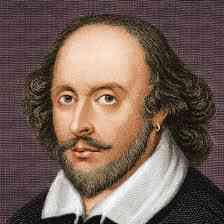William Shakespeare
The Tempest was the last of William Shakespeare’s play. It is a romantic drama that was probably completed in 1611 and was first printed in the Folio in 1623. Shakespeare tries to say his own feelings through the character of the magician, Prospero, the former Duke of Milan who lives with her daughter after being banished from Milan by his own brother Anthonio.
William Shakespeare, (1564-1616), English playwright and poet, was recognized in much of the world as the greatest of all dramatists. He is the most widely quoted author in history, and his plays have probably been performed more times than those of any other dramatist.

There is no simple explanation for Shakespeare’s unrivaled popularity, but he remains our greatest entertainer and perhaps our most profound thinker and had a remarkable knowledge.
He composed his plays during the reign of Queen Elizabeth I. During this period England saw an outpouring of poetry and drama, led by Shakespeare.
Although the exact date of Shakespeare’s birth is unknown, his baptism on April 26, 1564 was recorded in the parish register of Holy Trinity church in Stratford-up-Avon. He was born in Henley Street, Stratford-upon-Avon, Warwickshire. April 23 has traditionally been accepted as his date of birth.
The Tempest (1611), tragicomedy and romantic drama by William Shakespeare, probably the last plays attributable to his sole authorship.
Prospero was the Duke of Milan who loved magic and to read books and devoted most of the time in magic and Liberal Arts. As time passed Prospero got more wrapped in the study of liberal arts and magic and so left the management of Milan on his younger brother Anthonio’s shoulder. Gradually Anthonio got more and more greedy of being the Duke of Milan. He did not like the fact that though he was managing Milan, Prospero was called Duke of Milan. Anthonio began to feel that he was the Duke.
Anthonio along with Alonso, the king of Naples planned to overthrow Prospero from Milan. One night Prospero along with her three-year-old daughter, Miranda were taken to the seashore and put in a boat with neither sails nor oars to drift in the stormy sea. They were not allowed taking anything with them. But one of Alonso’s noblemen, Gonzalo secretly put some food, water, clothes and books that Prospero placed above his Dukedom in the boat.
But nothing really happened to them and landed on a lonely and deserted island. There he freed Ariel, an airy spirit and then made him his slave and told him he will be freed after her job is done.
Prospero lived in this way in the island for twelve years. One day Prospero ordered Ariel to cause a violent and ferocious storm at sea and wreck the ship at the sea but without hurting anyone. The ship was returning from Tunis to Naples, which carried Anthonio, Alonso, Sebastian, brother of Alonso, Ferdinand the son of Alonso and other crews. The ship was wrecked and Ferdinand was separated from the others.
Ferdinand was over-whelmed with grief because he thought that his father, Alonso had died at sea. But Alonso on the other side thought that Ferdinand is dead. Gonzalo tried to comfort Alonso by telling him that Ferdinand was still alive while on the other hand Sebastian and Anthonio blamed Alonso that it was his fault that Ferdinand was dead.
Suddenly Ferdinand heard strange music that was deliberately done by Ariel. This music attracted him towards Prospero’s cell where he met Miranda. When he first saw her he thought that she was a goddess, the goddess of the island. When Miranda also first saw him she also thought that Ferdinand was a god. But Prospero said that he is a normal human, not a god. Miranda and Ferdinand fell in love in their first sight. In fact, Miranda totally surrendered herself to Ferdinand. But Prospero wanted to know and test if Ferdinand was good enough for Miranda and so that they had a stable relationship in the future. Prospero forced him to work because of his magical powers. Ferdinand continued working because he loved Miranda. After all this Prospero finds that Ferdinand is the husband Miranda could get.
On the other side, Ariel dressed as a Harpy with her fellow ministers tell the “three men of sin” that why they had been through such a lot of trouble and told them to apologize to Prospero. Alonso Apologized to Prospero and appreciates Miranda as his daughter-in-law. Alonso felt repentant whereas, the other two sinners stay largely unchanged.
The two main plot of the play can be Prospero’s forgiveness of his enemies even though he could have imposed severe and lasting punishment upon them all and the other plot can be the case of love between Ferdinand and Miranda.
Prospero
Prospero, the leading character or the protagonist of the play, is the embodiment of wisdom. Everything in the play revolves around him. He dominates the play from the beginning and brings out the happy ending. He is an impressive section of the play.
He was the Duke of Milan but his greedy brother Anthonio and the king of Naples, Alonso had overthrown him and his one and only three-year-old daughter, Miranda. Prospero then lived in a lonely island for twelve years with, Miranda, Ariel and Caliban.
Prospero was a man possessing supernatural powers and because of these powers he may be regarded as a ‘superman’ or ‘superior man’. He is a man who, through his intensive studies and meditation over several years, has been able to acquire supernatural powers. He was a very learned, astute and intelligent man, wise and benevolent, skilled in holy magic, which were only used in good purposes. He liked to read books a great deal and spend his time in Liberal Arts and magic. There is such nobility in his exercise of his supernatural powers that he appears to be a beneficent Providence.
In a father’s role, Prospero was altruistic, benignant and considerate too. He was also Miranda’s tutor. Prospero does not want anyone to torment her daughter, Miranda. He loved his daughter the most in the whole world. Prospero’s love for Miranda is perhaps the most striking aspect of his character. He taught her in a way that she is never less intelligent than other princess. Only because of Miranda, Prospero had the determination to live longer when they first came to the island. He also wanted Miranda and Ferdinand to have a stable and enduring future. This is why he always showed severity towards Ferdinand.
As a Duke he was a bit irresponsible and lacking in determination because he left almost the total management of Milan on his brother, Anthonio’s shoulder. He also neglected his kingdom because he was busy learning magic. But the people of Milan still loved him a great deal and he was well reputed too. Under Prospero Milan became very prosperous and flourishing and also one of the leading state.
In the role of a brother, Prospero believed Anthonio blindly, this is why he left the management of Milan on his brother’s shoulder. He loved his brother just next to her daughter Miranda.
As a master of Ariel he was very generous as well as very strict to him too. Ariel worked for Prospero because he had done Ariel a favour. Ariel willingly carries out Prospero’s instructions. He treats Ariel very gently and affectionately. He employs several terms of endearment while talking to Ariel. But as a master of Caliban, he was very rude and uncouth and reveals his stern side. They had a very strange and queer relationship between them. Both of them criticized each other all the time. Caliban was forced to work for Prospero because of his magic. When Prospero and Caliban first met Prospero taught Caliban many things and gave him many uncommon things. But Caliban was very ungrateful. Prospero’s violence of language and harshness of behaviour was all because of his past events. This is why Caliban deserved to be a slave. Caliban accused Prospero of taking over him and the island as a colonial ruler. But Prospero refused. But later Prospero gave both of them back their own freedom.
As an enemy, he was not at all revengeful to his enemies, Anthonio and Alonso but wanted them to repent and apologize to him. He also did not want to hurt them but teach them a lesson. Prospero’s forgiveness of his enemies is a divine act.
Prospero is a self-portrait of William Shakespeare. We can discover a resemblance between them. There is a parallel between Shakespeare and Prospero. Through Prospero’s character Shakespeare expresses his own feelings, like when Prospero said that his days were near it indicated that Shakespeare’s days were also near and “The Tempest” was also Shakespeare’s last play. When Prospero said that soon he will give up his magic it indicated that Shakespeare was also going to give up his work at the Globe Theatre. Prospero had been in the island for twelve years. In the same way, it was approximately twelve years since the sequence of Shakespeare’s greater plays began. Prospero’s abandonment of his magic represents Shakespeare’s abandonment of the theatre. Prospero had been in full command of the island; similarly Shakespeare was the undisputed monarch of the theatre for many years. Ultimately when Prospero decides to go back to his native Milan; and in the same way Shakespeare, after leaving the Globe Theatre, went back to his native village. If Prospero was the superman of the island then Shakespeare was the superman of plays, because any writer in the entire history of drama has never surpassed his plays. This is why we can say that Shakespeare was delineating his own character through the portrayal of Prospero.
My assessment towards Prospero is that his own brother, Anthonio had victimized him, because if he had not trusted him whom could he have trusted.
Miranda
Miranda is the only female character in the cast of “The Tempest”. She can be regarded as a romantic figure in the play.
Miranda was the one and only daughter of the former Duke of Milan, Prospero who was banished from Milan and overthrown from his Dukedom by his own brother, Anthonio and the king of Naples, Alonso. She was very caring, courteous and compassionate towards her father because she always used to ask Prospero that she must have caused him a lot of trouble and dilemma. Miranda had always cheered Prospero up whenever he had been sad after they had been banished from Milan.
She was very piteous and generous because when she saw the ship and the men in the ship struggling in the violent sea, she went to her father to ask him to stop the storm, as she knew that his father made the storm. But Prospero said that no one would be hurt. She was also very self-content because after she and her father had been banished from Milan when Miranda was only three years old. Since then she had never wanted anything or go anywhere else. She had a positive response to nature that suggests that she had a good character as people who have a positive response to nature are taken as “good character”. She was as intelligent as other princess were because her father, Prospero who was very intelligent, taught her. She was also very sincere, trusting, candid and innocent. She swears by her modesty, which is her most precious treasure. She had a piteous nature and warm and sympathetic as well.
She was not at all like the typical women of the 16th century. She was like an unconventional heroine. Since Miranda had lived in the midst of nature almost right the way through her life. And so she had no idea about the Elizabethan love convention that existed during the 16th century. She therefore, does not follow any of these rules in her relationship with Ferdinand. She follows quite simply the dictates of her heart without any camouflage or artifice. She seems to endorse Shakespeare’s view of the ideal courtship that was mutual aid immediate acceptance of each other without the use of artificial love conventions. In creating a character like Miranda, Shakespeare has proved that he was a modern thinker and always favoured equal rights for both men and women.
She stood very firm in the decision with her love with Ferdinand. She was also very openhearted about her love. She expresses her desire without any inhibition. She showed a quick and deep love for Ferdinand in the play. She made a complete surrender of herself to the man he had fallen in love with, Ferdinand. She was also the first to propose Ferdinand, which was quite uncommon at that time in the 16th century and yet now too.
Miranda was also very fair, good-looking, beautiful modest and tender; this is why when Ferdinand first saw her he thought that Miranda was a goddess and fell in love with her in their very first sight. Her every word and act sparkles with
her exquisite tenderness and modesty. Miranda’s physical beauty and loveliness, her cheerful temperament, her simplicity and innocence, her sympathetic and gentle nature makes of her the most adorable and lovable and admirable person.
She has been regarded as one of the most charming creations of Shakespeare. Ferdinand finds her perfect and peerless. In his opinion, she has been created with every creature’s best. To sum up, Miranda possesses in an eminent quantity of all those excellent qualities that are ‘womanly’.
“The Tempest” is a very emblematic and symbolic play can also be related with the theme of colonialism and racialism. Caliban’s speech to Prospero has often be seen as a satire to the European conquest and suppression to the primitive people living in Africa and some parts of Asia and North America that existed during the 16th century during Shakespeare’s period. This process later came to be known as colonialism and racialism.
Colonialism, one country’s domination of another country or people—usually achieved through aggressive, often military, actions—and the territory acquired in this manner. The terms colonialism is sometimes used interchangeably, but scholars usually tell apart between the two, reserving colonialism for instances where one country assumes political control over another and using imperialism more broadly to refer to political or economic control exercised either formally or informally.
Racial Segregation, separation of the races where people live, or the public facilities they may use, such as schools, restaurants, public transportation, and stores. Racial segregation may be a government policy or a private practice of individuals, businesses, or institutions.
In this speech Caliban accuses Prospero of taking over him and the island just like a colonial ruler. The island used to be his own possession that he had inherited from his mother, Sycorax, who died. He says that when Prospero first came to the island he used to be very nice with Caliban and taught him the names of the sun and the moon and also gave him exceptional things like water with berries in it that he had never before seen at all in his life. Prospero was also very fond of Caliban and patted and caressed him. Caliban showed him the fertile and the barren and told him everything about the island. In this way Prospero gained the trust of Prospero. But then Prospero made Caliban his slave. And now he feels guilty and culpable that he had helped and served Prospero. He says that in those days he loved him a great deal but now he hates him. He says that Prospero is only robbing him of what belongs to him. Caliban says that now Prospero has segregated and confined him from the rest of the island and treated him just as if he was an animal.
This is why Caliban accused Prospero of taking over him and the island like a colonial ruler. But Caliban deserved to be a slave because he was very ungrateful and never listened to Prospero and also behaved very harsh and rude with Miranda. But Caliban had none other options because his hands were tied up before the magic of Prospero.
Therefore, we can see that the theme of colonialism and racialism is symbolized by “The Tempest”
The third of eight children, Shakespeare was the eldest son of John Shakespeare, a locally prominent glove maker and wool merchant, and Mary Arden. The young Shakespeare probably attended the Stratford grammar school, the King’s New School. As his family’s eldest son, Shakespeare ordinarily would have been apprenticed to his father’s shop after he completed grammar school, so that he could learn and eventually take over the business. One late 17th-century account, he was apprenticed instead to a butcher because of declines in his father’s financial situation. On November 27, 1582, a license was issued to permit Shakespeare’s marriage, aged 18, to Anne Hathaway, aged 26. The couple’s first child was daughter, Susanna, and twins—Hamnet and Judith. Sometime after the birth of the twins, Shakespeare left Stratford and went to London in 1592, when he was already at work in the theater. For this reason Shakespeare’s biographers sometimes refer to the years between 1585 and 1592 as “the lost years.” Shakespeare arrived in London at about 1588, and by 1592 he had attained sufficient success as an actor and playwright. In time the profits of this company and its two theaters, the Globe Theatre and Blackfriars, enabled Shakespeare to become a wealthy man. Shakespeare wrote nearly all of his plays from 1590 to 1611, when he retired to New Place.
Shakespeare wrote both tragedy and comedy. Some of his great tragedies were Hamlet, Othello, King Lear, Macbeth etc.
After about 1608 Shakespeare began to write fewer plays. In 1613 fire destroyed the Globe Theatre during a performance of Henry VIII. Shakespeare died on April 23, 1616—the month and day traditionally assigned to his birth—and was buried in Stratford’s Holy Trinity Church.
















